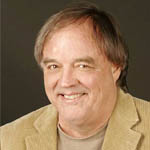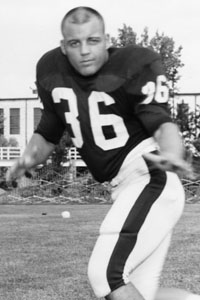
Vanderbilt emeritus professor of economics John Vrooman, who had a passion for all things sports and taught one of the most popular classes at Vanderbilt focusing on sports economics, passed away on July 5 after a battle with Amyotrophic Lateral Sclerosis (ALS). He was 73.
Before he passed, Vrooman asked that he not have an official obituary, but fellow economics professor Robert Driskill wrote this remembrance of Vrooman, who had a teaching career that spanned almost five decades. He taught at Vanderbilt for close to 20-years before illness led him to retire.
Remembering John Vrooman
John Vrooman died Sunday, July 5, from ALS. John, a longtime admirer of many Yankee baseball greats, would have undoubtedly preferred that we refer to his illness as “Lou Gehrig’s” disease. John had a long and illustrious career as an economist, winning numerous teaching awards and publishing important papers in sports economics. John brought a unique perspective to his jobs in part because of his experiences in American football—and in life.

John was a prominent Dallas, Texas high school player for the prestigious private St. Mark’s school, from which he graduated in 1964. He was recruited from a public school by St. Marks to play football, and that progression from public to private school let him identify with and counsel many undergraduate college students who had followed a similar path. He was forever grateful for the opportunity to attend an elite high school. He enjoyed telling people about how he played alongside the now-famous actor Tommy Lee Jones.
He was offered an athletic scholarship to Vanderbilt, but chose instead to attend and play as a defensive back for Kansas State, covering the tight ends from Nebraska, Oklahoma, Texas, and Texas A & M. He is still the eighth-ranked punt returner for Kansas State. After a coaching change at Kansas State, John moved back to Texas and finished his degree at University of Texas, Austin.
He taught high school for a few years—in part because he could coach the football team—and then went back to the University of Texas to earn his Ph.D. in economics. His advisor was the former Secretary of Labor, Ray Marshall. Not surprisingly, John started his professional life as a labor economist. But as John accumulated teaching awards from the University of Utah and from Louisiana State University, he began focusing his research on the economics of sports. He wrote fourteen peer-reviewed papers that have received over 1000 citations, the most notable being “A General Theory of Professional Sports Leagues,” in the 1995 Southern Economic Journal.
Furthermore, he became perhaps the most-quoted sports economist around the world, providing his expertise to various news outlets on everything from American football to that other football we in the United States know as soccer, to the Olympics.
Moving from Rice University to Vanderbilt in 1999, John established himself as one of the most popular instructors in the university. For many years he taught several sections of large introductory economics courses and two specialized courses on the economics of sports. One trademark was the relaxed atmosphere he maintained in the classroom, which he reinforced with his wardrobe choices: cargo shorts from opening day of major league baseball until the end of the World Series, accompanied by Vanderbilt-logo black collared tee shirts and sandals, and then blue jeans—along with the same tee shirts but with trainers–in the interim. Another was his non-required but heavily attended “lab” session on Friday afternoons at a local sports bar.
Sitting next to John’s office, though, was where you could see the passion and dedication he brought to his teaching. A steady stream of students came by to talk economics, but also to talk about life. As a Division One football player, John could empathize with the pressures many Vanderbilt students faced as they juggled school and time-consuming co-curricular activities. He also freely dispensed sports advice to student athletes. Whether future NBA players really thought John knew more than them about how to set a pick, or whether women lacrosse players really thought he knew much about cradling a lacrosse ball, they returned repeatedly to talk it over with him—and to talk about their lives in general.
Diagnosed with ALS in 2018, he continued to write on sports economics until a few weeks before his death, when he decided against invasive measures to prolong his life.
He died peacefully surrounded by his family.
John met life head on, with great passion. I think his description of how he responded when he was asked by his Kansas State coach if he would return punts is a great illustration of John’s personality: he told the coach he would only do it if the staff understood he would never “fair catch” the football. And he never did.